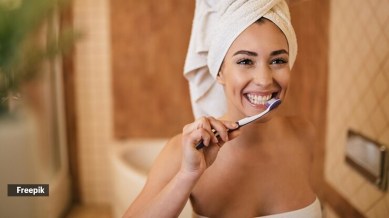📣 For more lifestyle news, click here to join our WhatsApp Channel and also follow us on Instagram
Should you rinse your toothbrush with soap? Here’s what a dentist has to say
While soap may have antimicrobial properties, its use for toothbrush sanitation poses unnecessary health risks.

Life hack videos often warn against keeping toothbrushes in the washroom due to the risk of germs and bacteria settling on the bristles. Some creators suggest washing toothbrushes with soap to tackle this issue. Indianexpress.com checked whether this hack is dentist-approved.
“As a dentist, I do not recommend washing toothbrushes with soap. While soap can remove debris and kill bacteria, the potential risks of ingesting soap residues outweigh its benefits for toothbrush sanitation,” said Dr P Parthasarathi Reddy, cosmetic dentist and founder of FMS Dental Hospitals.
monthly limit of free stories.
with an Express account.
What happens if one washes their brush with soap?
“Firstly, there’s a risk of ingesting soap residues, which can cause gastrointestinal discomfort. Additionally, if the soap is not rinsed off thoroughly, it can leave an unpleasant taste on the toothbrush, impacting the overall brushing experience,” shared Reddy.
Moreover, soap residues left on the toothbrush may not effectively eliminate all bacteria, leading to concerns about compromised oral hygiene, he added.
How can you keep your brushes clean?
“To keep toothbrushes clean and minimise bacterial growth, the ADA recommends rinsing toothbrushes with water after each use and allowing them to air-dry upright in an open area,” said Dr. Reddy.
He advised against covering toothbrushes, as this creates a moist environment conducive to bacterial growth.
He emphasised the importance of regularly replacing toothbrushes every three to four months, or sooner, if the bristles become frayed, to maintain optimal oral hygiene.
For those seeking extra precautions, he suggested soaking toothbrushes in an antibacterial mouthwash or using a toothbrush sanitiser as viable alternatives.
He also mentioned a 2016 study conducted by Adil Basman et al., which suggests that submersion in 50 per cent white vinegar is an effective and cost-efficient method for disinfecting toothbrushes at home.
📣 For more lifestyle news, click here to join our WhatsApp Channel and also follow us on Instagram